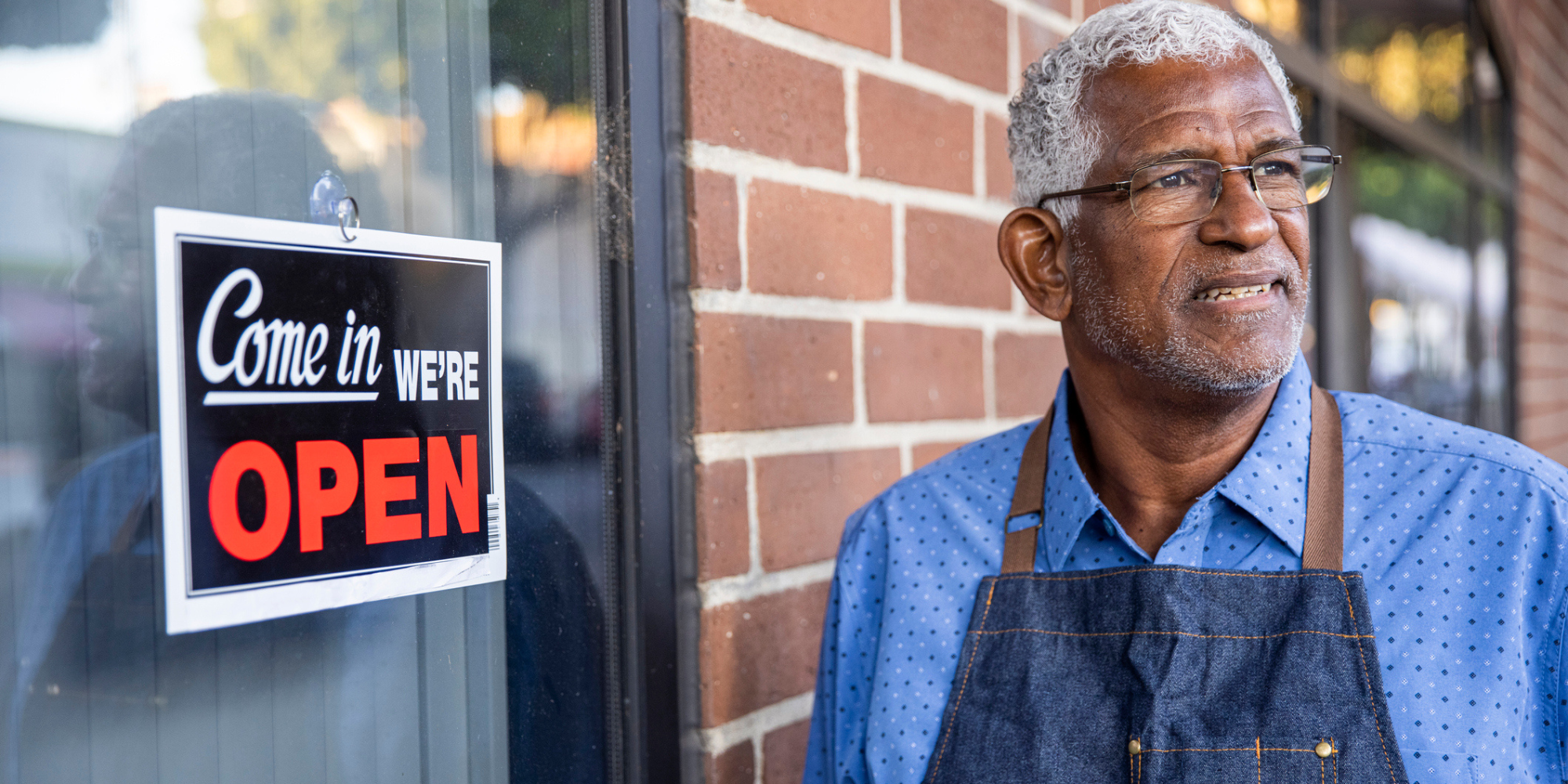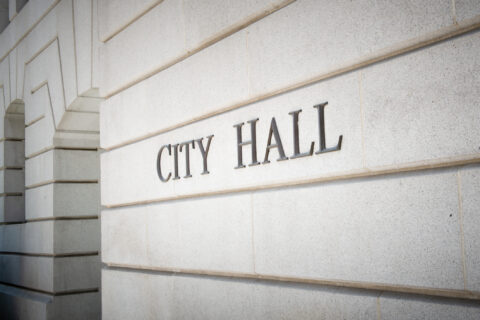According to the Urban Institute, “Long before the pandemic, the US had highly inequitable disparities in business ownership by race and ethnicity. Because of decades of racist practices and policies, such as discrimination and redlining designed to segregate and limit wealth building and access to capital, Black and Latino people were significantly underrepresented at the start of the pandemic in business ownership relative to their shares of the population.”
At the 2022 City Summit in Kansas City, MO, the National League of Cities (NLC) welcomed the latest participants in the City Inclusive Entrepreneurship (CIE) program, which seeks to address these inequities and underrepresentation of entrepreneurs of color and from other underrepresented backgrounds. Through generous sponsorship from the Ewing Marion Kauffman Foundation, participants and friends of the 2022-23 CIE program were invited to kick off the new program year at a celebratory reception in their honor. Not only did guests enjoy tastes and drinks from Kansas City’s own entrepreneurs during the networking hour, but they also formally committed to the year ahead in a high-energy ceremony before wrapping up the evening.
Now in its fourth year, this program has grown to include more than 200 cities, 250 local partners and $100 million in committed resources. By joining CIE, cities are provided resources and support to help entrepreneurs of color and those from underrepresented backgrounds achieve greater economic mobility, reduce the racial wealth gap, and create more equitable outcomes for local entrepreneurs and small businesses.
Participating cities select a commitment that aligns with the strategic priorities for their small business community. These 13 commitments are built around the four pillars of America’s New Business Plan, which aims to ensure that “anyone with an idea has access to the opportunity, funding, knowledge and support to turn it into a reality.”
Once a commitment is chosen, cities are partnered not just with other cities in their chosen cohort, but also with technical program experts. They will share their successes and challenges with each other, and they will have access to program experts’ support throughout the grant year to help implement their projects and provide valuable feedback.
We know more equitable and accessible local economies take time to bloom and grow, and these year-long projects are just one piece of each community’s inclusive development strategy. Yet by joining the CIE program, these cities have signaled the importance of taking decisive action in the near term to improve economic opportunity for underserved communities. We look forward to the brighter economic future they are creating, one small business at a time.


This year, 57 cities from across the country made 73 commitments to implement year-long projects that will help foster economic growth in their communities. Please join us in welcoming these cities, whose commitments include:
- Increasing supplier diversity through equitable procurement strategies at anchor institutions such as universities, hospitals, corporations and utility companies (City of Tallahassee, FL; City of St. Louis, MO; City of Houston, TX; City of Pearland, TX)
- Reducing barriers to earning city contracts for Black, Indigenous and people of color (BIPOC)- and women-owned businesses (City of Lauderhill, FL; City of New Orleans, LA; City of Charlotte, NC; City of Toledo, OH; City of Oregon City, OR)
- Rethinking how to solicit tech solutions and attract potential partnerships with startups and tech-based entrepreneurs (City of Peoria, IL; City of Grand Rapids, MI; City of Las Vegas, NV; City of Raleigh, NC; Town of Irmo, SC)
- Diversifying economic development boards and commissions with a focus on gender equity (City of Richmond, IN; City of New Orleans, LA; City of Columbia, MO; City of Webster Groves, MO)
- Helping entrepreneurs formalize their businesses so they can access more resources (City of San Diego, CA; City of Detroit, MI; City of Rochester, MN; Memphis, TN)
- Lowering barriers for Hispanic/Latinx entrepreneurs to start and grow a business (City of Tucson, AZ; City of New Orleans, LA; City of Kansas City, MO; City of El Paso, TX; City of Salt Lake City, UT)
- Equipping aspiring entrepreneurs with the skills they need to start a business (City of Kankakee, IL; City of Overland Park, KS; City of Jackson, MI; City of Buffalo, NY; City of Jamestown, NY; City of Franklin, TN; City of Richmond, VA)
- Cataloging local resources available to entrepreneurs (City of Montgomery, AL; City of Stockton, CA; City of Lakeland, FL; City of Honolulu, HI; City of Omaha, NE; City of Pearland, TX)
- Building a microlending platform to serve entrepreneurs without access to traditional finance (City of Jackson, MS; City of Pearland, TX)
- Prioritizing business supports and financial empowerment for early childcare providers (City and Borough of Juneau, AK; City of Jacksonville, FL; City of Rochester, MN; City of Las Vegas, NV; City of Santa Fe, NM; City of Beaverton, OR)
- Helping innovative Black-owned firms raise venture capital and connect to mentorship networks (City of Phoenix, AZ; City of Manhattan, KS; City of New Orleans, LA; City of Oklahoma City, OK; City of Richmond, VA)
- Establishing and/or enhancing a network of entrepreneurial resource partners to accelerate small business goal attainment (City of Berkeley, CA; City of Stockton, CA; City of Durango, CO; City of Wilmington, DE; City of Washington, DC; Village of Matteson, IL; City of Dubuque, IA; City of Springfield, MA; City of Rochester, MN; City of Tulsa, OK; City of Chattanooga, TN; City of Houston, TX; City of Richmond, VA)
- Understanding local entrepreneurial ecosystems through both quantitative and qualitative data (City of Montgomery, AL; City of Honolulu, HI; City of Easthampton, MA; City of Grand Rapids, MI; City of St. Louis Park, MN)
Here is the list of commitments cities have pledged for the 2022-2023 CIE Program grant year:
- Public Procurement
- Anchor Procurement
- Working with Startups
- Entrepreneurial Ecosystem Data
- Ownership and Optionality
- Ecosystem Accelerator
- Informal Entrepreneurship
- Hispanic/Latinx Business Owners
- Entrepreneurship Curriculum
- Ecosystem Mapping
- Leadership Diversity
- Microlending
- Early Childhood Workforce
Dig Deeper
Learn more about NLC’s City Inclusive Entrepreneurship (CIE) program, and the cities that are committing to innovation, equity, and entrepreneurship.









